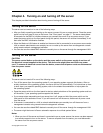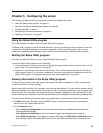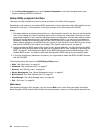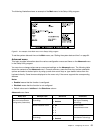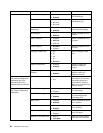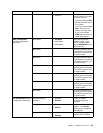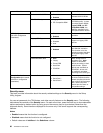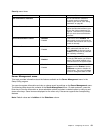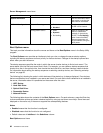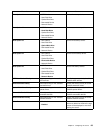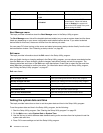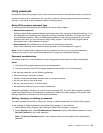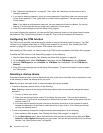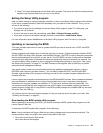
Menu item
Submenu item Selections Comments
Onboard LAN2 I/O ROM
• Disabled
• Enabled
Enable or disable the
onboard LAN2 I/O ROM.
PCI ROM Priority • Legacy ROM
• EFI Compatible ROM
Choose a mode for the
PCI ROM priority. In case
of multiple Option ROMs
(Legacy ROM and EFI
Compatible ROM), the
selection species which
PCI Option ROM to launch.
USB Controller
• Disabled
• Enabled
Enable or disable the USB
controller.
Legacy USB Support
• Enabled
• Disabled
• Auto
Enable or disable the
support on legacy USB
devices.
Port 60/64 Emulation
• Disabled
• Enabled
Enable or disable the
port 60h/64h emulation.
This function is for the
operating system that does
not support legacy USB
devices.
USB Conguration
(set USB conguration
parameters)
TANDBERGRDX 3040
• Auto
• Floppy
• Forced FDD
• Hard Disk
• CD-ROM
Mass storage device
emulation type. Auto
means to enumerate
devices according to their
media format. Optical
devices are emulated as
“CD-ROM”; drives with
no media are emulated
according to the drive type.
Console Redirection
Conguration (set console
redirection conguration
parameters)
Console Redirection
• Disabled
• Serial Port 1
• Serial Port 2
The setting species how
the host computer and the
remote computer (which the
user is using) will exchange
data. Both computers
should have the same or
compatible settings.
Security menu
This topic provides information about the security related settings on the Security menu in the Setup
Utility program.
You can set passwords, the TPM feature, and other security features on the Security menu. The following
table shows the contents of the Security menu. For each menu item, press the Enter key to show selectable
options and select a desired option by using up and down arrow keys or type desired values from the
keyboard directly. Some items are displayed on the menu only if the server supports the corresponding
features.
Notes:
• Enabled means that the function is congured.
• Disabled means that the function is not congured.
• Default values are in boldface in the Selections column.
60 ThinkServer User Guide




